Have you ever caught your feline friend eyeing the fruit bowl on the kitchen counter, especially when it’s laden with juicy blackberries?
So, can cats eat blackberries?
You might be pondering whether it’s safe to share a bite of that juicy berry with your cat. The answer is yes, blackberries are safe for cats to nibble on.
These succulent fruits are not only harmless but also offer a bounty of nutritional perks when given in appropriate amounts.
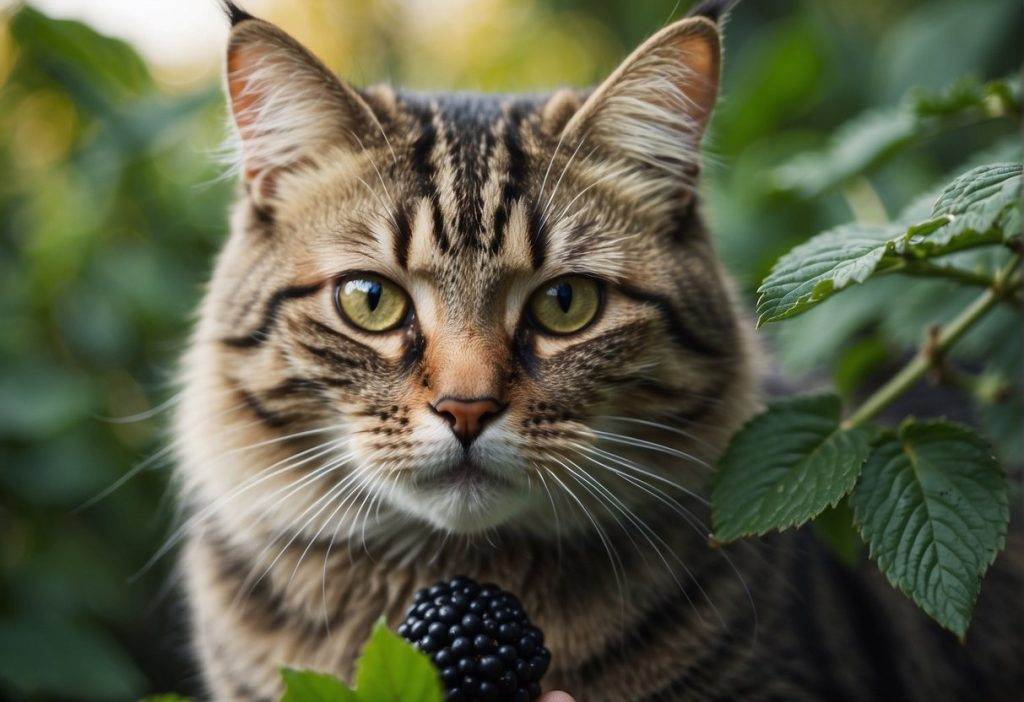
However, while it’s fine to let Fluffy have a taste, it’s essential to remember that moderation is key. Unlike humans, cats are obligate carnivores, which means the bulk of their nutrition should come from protein.
Blackberries can be a healthy treat, offering vitamins, minerals, antioxidants, and nutrition that can support their overall well-being.
To avoid any potential health issues, including obesity, it’s recommended to introduce any new food into your cat’s diet gradually and under the guidance of a vet.
Let’s not forget that overindulging could lead to an upset stomach, and we all know how much our furry companions dislike that!
Key Takeaways
- Blackberries are safe and nutritious treats for cats when given in moderation.
- Cats are obligate carnivores, and their primary diet should be high in protein.
- Consult a vet before introducing new foods to your cat’s diet to prevent digestive issues.
Nutritional Profile of Blackberries
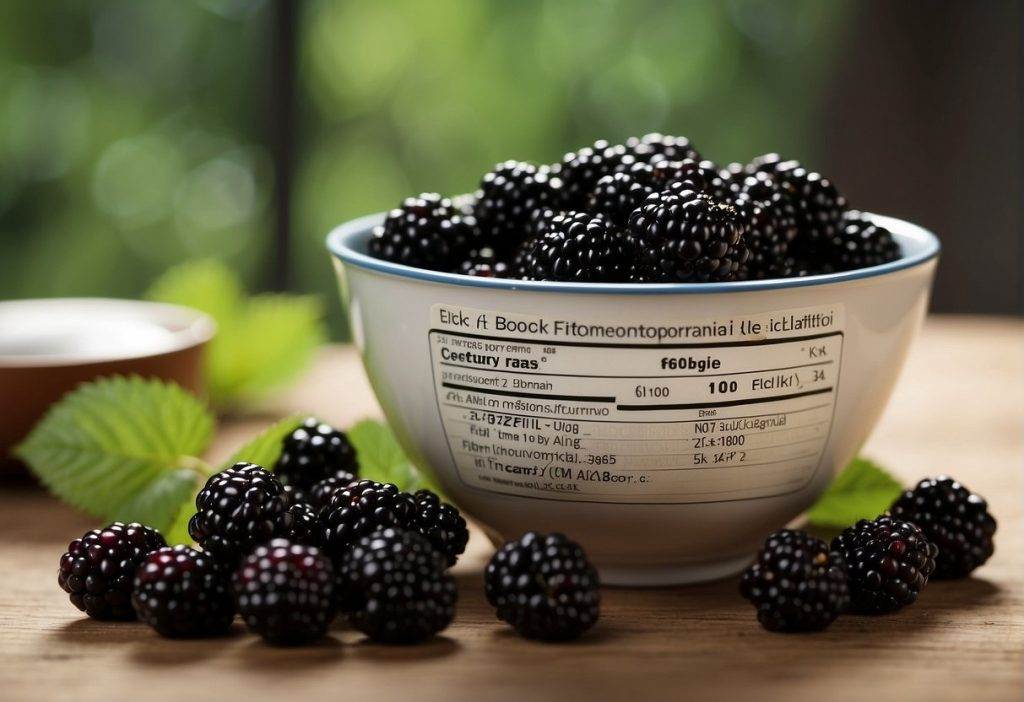
Hey there, have you ever peeked at what’s inside those juicy blackberries you’re about to share with your furry friend?
Blackberries pack a nutritional punch, and knowing what’s in them can help you understand how they might benefit your cat. Let’s check out what these dark beauties have to offer!
- Vitamins:
- Fiber: Great for the tummy, fiber in blackberries can help keep your cat’s digestion smooth and regular. (3)
- Antioxidants: These help fight off free radicals, which might make your cat less prone to diseases. (4)
Interestingly, blackberries are low in sugars and fats, which is good news since kitties do best on a low-carb diet. Here’s a snapshot of their nutritional content:
| Nutrient | Why It’s Good for Your Cat |
| Vitamin C | Supports the immune system |
| Vitamin K | Aids in blood coagulation |
| Fiber | Helps with digestion |
| Antioxidants | Combat disease-causing free radicals |
Though blackberries can offer a delicious nibble for your cat, remember that their primary diet should be meat-based, tailored to their carnivorous needs.
Think of blackberries as a delightful treat, not a diet staple. Always introduce any new food in moderation to avoid tummy upsets.
Plus, it’s a fun way to add a little variety to their diet, don’t you think? Just like you, your cat might appreciate a burst of berry goodness, like blackberry jam, once in a while!
Can Cats Eat Blackberries?
Ever wondered if your furry friend can join you in snacking on blackberries? Well, the answer is a pawsitive, yes, but there are a few things you should keep in mind.
Just like when we try a new food, it’s always a good idea to introduce blackberries to your cat in small portions. Watch their reaction closely—every cat is an individual, after all!
As a rule of thumb, treats, that include a small amount of blackberries, should consist of no more than 2% of your cat’s daily diet.
This ensures that their nutrition stays balanced and doesn’t interfere with their main meals, which should always be specially formulated for felines.
Too many berries can lead to an upset stomach, so moderation is key!
Before serving up a berry bonanza, let’s talk preparation:
Safe Quantities and Frequency
- Start with a tiny portion (imagine a treat, not a feast!)
- Gradually introduce blackberries
- Observe how they react to the new treat
- Limit blackberries to less than 2% of their daily food intake
Preparation and Serving Suggestions
- Wash the blackberries thoroughly to remove pesticides and dirt
- Remove any stems or leaves (these are no-nos for kitty consumption)
- Serve blackberries mashed or whole—whichever your cat prefers!
Remember, variety is the spice of life! Offering a well-washed blackberry as an occasional treat can be a delightful surprise for your four-legged companion.
So, the next time you’re enjoying some blackberries, feel free to toss one (just one!) your cat’s way. Watch as they experience the berry thrill—under your careful supervision, of course!
Risks and Precautions
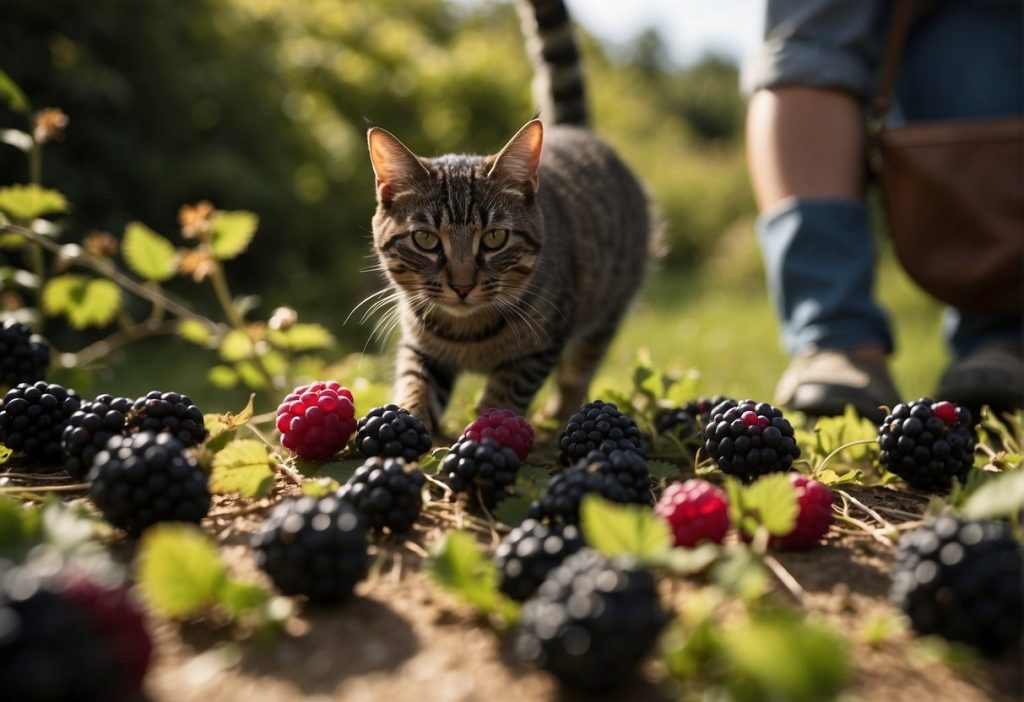
Hey there, cat lovers! Ever wondered if those juicy blackberries can be a tasty treat for your furry friend? Let’s get the scoop on snacking smart and safe.
Potential Health Risks:
- Choking: Those little round berries, while small, can still pose a choking hazard. (5)
- Digestive Upset: Cats have sensitive tummies, and blackberries might cause gastrointestinal issues like vomiting or diarrhea. If your cat has a sensitive stomach, you should give food that is specifically for sensitive digestion.. (6)
Case Study: Some whiskered companions have shown allergic reactions. It doesn’t happen to every kitty, but it’s something to watch out for.
Signs of Allergic Reactions or Intolerance:
- Vomiting: Not the best sign, right?
- Diarrhea: Quite messy and not pleasant for your cat (or you).
- Itchy Skin: If your cat seems more scratchy than usual after munching on blackberries, it could be an allergy. (7)
What to Do: Got a cat that’s acting up after trying blackberries? It’s always best to chat with your vet. They can give you the expert lowdown and, if necessary, map out a plan to keep your kitty feeling purr-fect.
Remember, better safe than sorry. Those berries aren’t going anywhere, so there’s no rush in turning them into a feline feast.
Keep a close eye on your cat and always, always go for moderation when introducing new snacks to their diet, especially for plant-based snack for cat. And if in doubt, give your vet a shout!
Expert Opinions and Veterinary Advice
Ever wondered if your feline friend could join in on your berry snacking? Well, let’s hear it straight from the experts—veterinarians.
Insights from Veterinarians
Veterinarians agree that while cats are obligate carnivores, the occasional fruit like blackberries, strawberry won’t hurt. They are packed with vitamins and antioxidants which sound beneficial.
However, Dr. Hannah Godfrey notes that variety might be tempting, but moderation is key—cats’ digestive systems aren’t ideally set up for processing fruits. (8)
Have you heard of cats munching on berries without any issue? Sure, some do, but it’s vital to remember your pet’s needs might differ.
Each cat is unique; a treat for one might be trouble for another. So, get personalized guidance from your vet, tailored just for your furry companion.
Research and Studies
Feline diet research suggests that while blackberries aren’t toxic, they aren’t a dietary requirement either. Curious, isn’t it?
Blackberries can offer vitamins A, B, C, E, and K, and minerals like iron and potassium, which sound like a super snack.
However, before you toss a berry to your cat, consider this: Studies show that excess fruit may lead to digestive issues, affecting overall health. No one wants that for their kitty!
Here’s the scoop in a bite-sized chunk:
| Benefits | Cautions |
| + Vitamins & Minerals | – Not a dietary need |
| + Antioxidants | – Possible digestive upset |
Remember, a happy cat is a healthy cat. When considering adding something new to their diet, like blackberries, it’s wise to be informed and cautious.
Got questions? Always have a chat with your trusty vet—they’re the pros when it comes to your cat’s diet!
Behavioral Aspects and Cats’ Interaction with Blackberries
Have you ever seen your furry friend curiously sniffing at your fruit salad? While you may find blackberries tantalizing, your cat might not share your enthusiasm.
Cats are obligate carnivores, which means they’re all about protein and not so much the sweet stuff.
But why the cold shoulder to fruits?
Well, your cat’s taste receptors are not tuned to detect sweetness, which is typically a big draw for us fruit-loving humans.
So, if you offer them a Blackberry, don’t be surprised if they give it a pass.
Tip: If you’re looking to diversify your cat’s palate and are considering blackberries, introduce them carefully. Cats are creatures of habit, and new foods can be off-putting. Here’s how you could do it:
- Start Small: Offer a tiny blackberry piece and observe their reaction—it’s the cat’s way of taking a cautious sniff at something new.
- Positive Association: Pair the blackberry with their regular food to create a familiar context.
When you’re introducing blackberries, keep it fun! It’s a bit like sneaking veggies into a child’s meal – it’s all about the presentation.
And if your cat seems indifferent, that’s normal. Remember, they rule the roost, and their food preferences are no exception.
So, next time you’re munching on these juicy berries, it’s perfectly fine to let your kitty have a little taste—if they’re interested.
Just be sure it’s pesticide-free, and don’t go overboard. A cat’s stomach can be quite sensitive, after all.
Alternatives to Blackberries
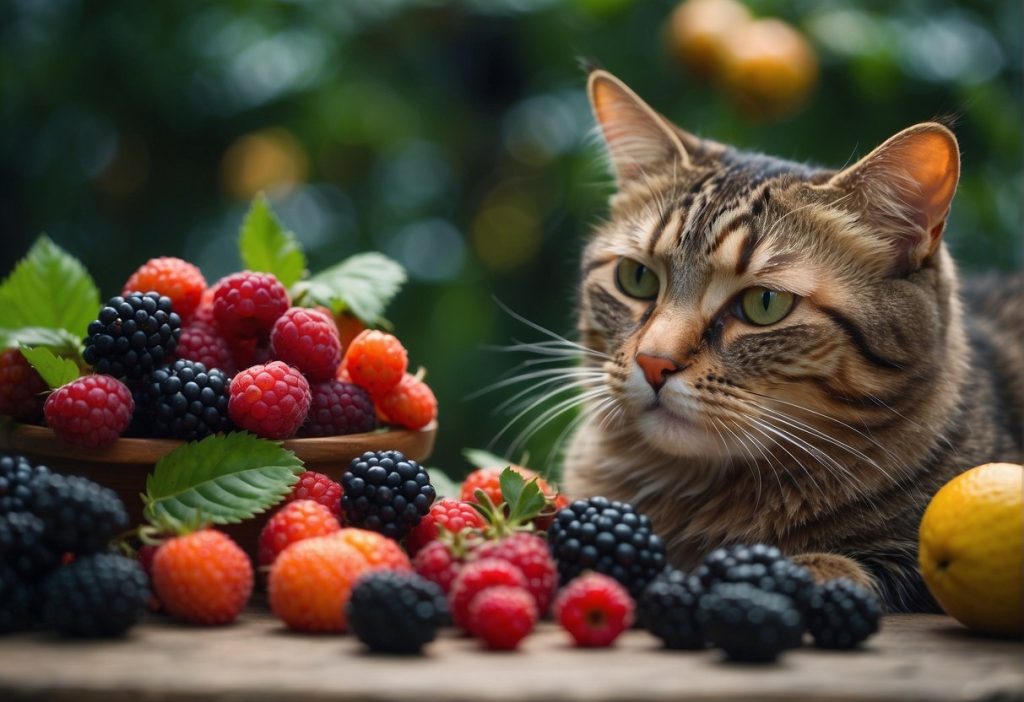
Curious about what other treats you can offer your kitty that are a tad different from their usual fare? Let’s explore some safe fruity options that you can introduce to your cat’s diet.
But remember, moderation is key, and it’s always good to start with a small taste test.
Other Safe Fruits for Cats:
- Melon: Cats often enjoy the juicy texture of melon. You can give them a small cube or ball as a hydrating snack.
- Bananas: A bit of banana can be a healthy treat. Just slice it into small, manageable pieces for your pet.
- Apples (no seeds): Yes, an apple a day can also apply to your cat. Just ensure there are no seeds and the slices are skinless and small.
Note: Always introduce new fruits cautiously to monitor for any allergic reactions or digestive issues.
Commercial Cat Foods with Berry Ingredients: Have you seen those premium-looking cat foods with berries on the label?
Many high-quality commercial cat foods now incorporate fruits to provide a balanced diet with a punch of antioxidants.
When browsing, look for well-reviewed brands and check the ingredient list to ensure the product is free of artificial additives and fillers.
Advice: Quality is pivotal when selecting commercial cat food. Look for options with whole ingredients, and don’t hesitate to consult with your vet when switching up your cat’s diet.
Remember, while variety is the spice of life, when it comes to your furry friend, their health and safety come first. Always serve alternative treats sparingly and keep an eye on how they react. Happy snacking, kitty!
Quick Recap
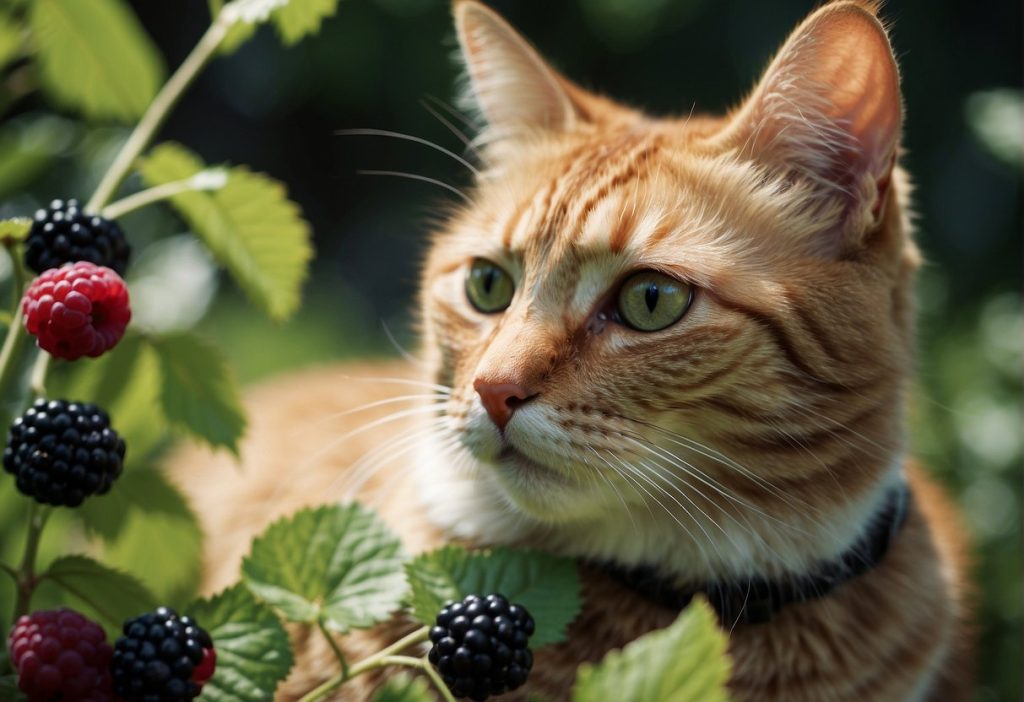
Have you been wondering if your furry friend, cat parents, can nibble on some juicy blackberries? Cats can eat blackberries in moderation.
Blackberries are non-toxic to felines and are packed with vitamins A and C, along with fiber. They’re also low in calories and fat, which makes them a nutritious treat—just the kind your kitty might thank you for!
Key Points to Remember:
- Moderation is King: Like any treat, blackberries should be given in small amounts. Think of them as an occasional snack, not a meal replacement.
- Safety Comes First: Ensure that the blackberries are clean and free from pesticides.
- Health Benefits?: While they offer nutrients, don’t expect miraculous health benefits as cats have different dietary needs from ours.
You may be asking, “But will my cat even like blackberries?” That’s a furry good question! Some cats might turn their noses up—after all, they’re obligate carnivores. But others might be curious enough to try a berry or two.
Here’s a simple checklist to follow:
- Start Small: Give your cat one or two berries and observe for any adverse reactions.
- Watch For Safety: No signs of blackberries being harmful on the ASPCA poison control page.
- Check with Vets: When in doubt, your vet’s advice is golden.
Remember, every cat is unique. What’s a delectable treat for one might be completely ignored by another. Feel free to offer some blackberries and let your cat decide. Happy feeding!
Frequently Asked Questions
Curious about whether your feline friend can join in on your berry snacking? Let’s address some common questions that cat owners have about cats and blackberries.
Are blackberries safe for all cats?
Most cats should be able to eat a blackberry without any issues, as they are not toxic to felines.
However, individual cats may react differently, so starting with a small amount is wise to gauge your cat’s tolerance.
What Other Berries Can Cats Enjoy Without Risk?
Cats can also safely enjoy blueberries and strawberries in moderation.
These berries are not toxic to cats and can be a good source of vitamins, but remember, they should only be a tiny part of their diet.
How many blackberries can I feed my cat?
Stick to one or two blackberries as an occasional treat. Cats are obligate carnivores, so their main diet should be high-quality cat food.
Fruits like blackberries are only meant to be a small extra.
What are the signs of an allergic reaction to blackberries in cats?
Watch out for itching, swelling, or digestive upset as signs of an allergic reaction.
If you notice any unusual symptoms after your cat eats blackberries, it’s best to contact your vet.
Can Cats Experience Any Benefits from Eating Blackberries?
Blackberries are packed with antioxidants and vitamins, which might be beneficial for your cat.
That said, their primary nutritional needs are vastly different from ours, so these benefits are often marginal.
Can I give my cat processed blackberry products like jam?
It’s best to avoid processed blackberry products like jams or jellies. These contain high levels of sugar and preservatives that are not suitable for cats.
Stick to fresh, washed blackberries in small amounts.
- Where to find the most trustworthy real money casinos - August 7, 2025
- Online Casinos That Approve PayPal: The Ultimate Overview - August 7, 2025


